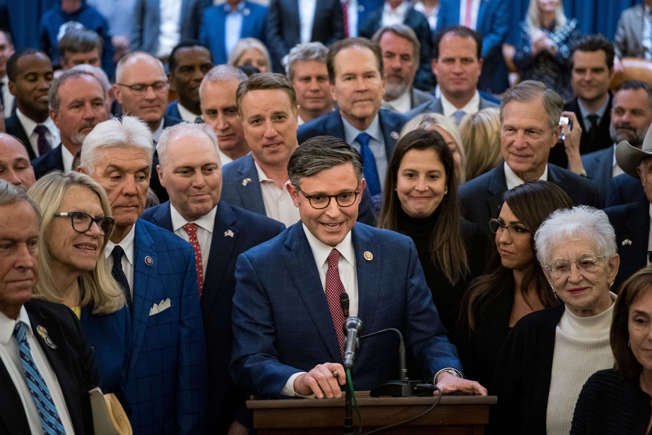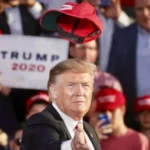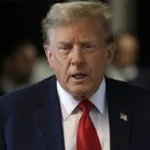Speaker of the House Mike Johnson announced Friday that Republicans would introduce a bill in Congress to prevent what he said is a “threat of fraud” from noncitizens voting, but data and studies show there’s not a problem to be solved.
Standing alongside former President Donald Trump at Mar-a-Lago, Johnson provided no evidence for past fraud by undocumented immigrants, instead saying, “We cannot wait for widespread fraud to occur.”
Experts who spoke to USA TODAY said allegations of noncitizens altering elections are myths and at worst xenophobic lies that erode trust in the electoral process.
“It makes people think that hordes of unknown, unnamed people who look different from other people are voting and casting ballots, and that’s just not true,” said Michael Waldman, the president and CEO of the Brennan Center for Justice at New York University, a nonpartisan good-government group. “It’s a scare tactic.”
After Trump won the Electoral College but lost the popular vote in 2016, he claimed without evidence that would have won the popular vote “if you deduct the millions of people who voted illegally.” Similar false claims of voter fraud became the basis of his rejection of his defeat in 2020, which culminated in Jan.6, 2021 violent attack on the U.S. Capitol by his supporters.
Noncitizen voting is virtually nonexistent
Federal law already prohibits noncitizens from voting in federal elections. An extremely small number of noncitizens have cast ballots. The votes were often cast by mistake, and there were far too few to alter the outcome of a race.
A 2017 study from the Brennan Center found that only two of 42 jurisdictions studied had improper noncitizen voting. There were 30 cases, out of more than 23 million votes cast, accounting for .0001% of the votes in those places.
“There are very few cases of noncitizens casting or attempting to cast a vote in a federal election,” said William Adler, the associate director of the elections project at the Bipartisan Policy Center. “The number of cases isn’t zero, but it’s pretty darn close when you look at it as a fraction of the total number of votes cast.”
The Brennan Center study also looked at Virginia, New Hampshire and California — three states Trump alleged had “serious voter fraud” in 2016. “No official we spoke with identified an incident of noncitizen voting in 2016,” the study said, referring to conversations with elections administrators in those states.
In 2017, Texas prosecuted a permanent resident and mother of four for voting illegally, and sentenced her to eight years in prison. The woman came to the U.S. as an infant, and her lawyer told the New York Times she did not know she wasn’t eligible to vote.
“The vast majority of these cases are usually someone who legitimately thought they were allowed to vote, which just speaks to the need of better voter outreach and education on the elections process,” Adler said.

Growing concern about noncitizen voting
In addition to the federal law banning noncitizen voting, the National Voter Registration Act requires people who register to vote to declare under penalty of perjury that they are eligible to vote.
Johnson is proposing a new law to require Americans to provide proof of citizenship when they register to vote and to require states to remove noncitizens from voter rolls. (The federal law already outlines a process that states must use to clean their voter rolls.)
“There are so many illegals in the country that if only 1 out of 100 voted, they would cast potentially hundreds of thousands of votes in an election,” Johnson said. “That could turn an election. This could be a tight election in our congressional races across the country. It could, if there are enough votes, affect a presidential election.”
Some liberal cities have voted to allow noncitizens to vote in local elections, but not in state or federal elections.

The Great Replacement theory
Some allegations of noncitizen voting echo the so-called Great Replacement, a white supremacist theory that blames the nation’s demographic shifts on Jews, which inspired mass shooters in Pittsburgh and Buffalo. Republicans all over the country have repeated a version of the theory that accuses Democrats of importing voters to win elections.
Johnson said Friday that an influx of immigrants under Democratic leadership is “one of their designs” that they created “because they want to turn these people into voters.” He did not provide evidence for this belief, saying only that social services agencies often help people register to vote.
In Texas, which has the longest border with Mexico in the country, new voter registrations are down, according to Secretary of State Jane Nelson. The state saw just under 58,000 new registrations this year through April 3, she said in a news release, compared to 65,000 during the same time period in 2022 and 104,000 in the same time period in 2020.
Cleta Mitchell, a lawyer who was on Trump’s infamous phone call in 2020 pressuring Georgia Secretary of State Brad Raffensperger, a fellow Republican, to “find” votes to win the election, has been claiming noncitizens are voting as part of her new initiative called the Election Integrity Network. Raffensperger refused Trump’s request.
“The once-fantastical lie that the 2020 election was somehow ‘stolen’ from President Trump through voting-machine irregularities, foreign intervention, or out-and-out fraud has become repetitive, boring, and sad,” Raffensperger wrote in National Review, a conservative magazine, in January.
“We’re being invaded by aliens from across the southern border,” Mitchell told a conservative radio host in February. “We have no idea who these people are. We know they’re not citizens. But they’re being registered to vote.” She did not provide evidence for this claim during her interview.
Helen Brewer, a policy specialist for the National Conference of State Legislatures, said there is no state constitution that allows noncitizens to vote in state or federal elections. And seven states, including swing states like Arizona and Colorado, have passed explicit bans on noncitizen voting.
That number could increase soon. Four states — Iowa, Idaho, Kentucky and Wisconsin — will have ballot measures to amend their constitutions to ban noncitizen voting in November, Brewer said. Wisconsin is a battleground that Trump won in 2016, but President Joe Biden recaptured in 2020.
Secretaries of state ‘not aware’ of noncitizen voting
The conservative Heritage Foundation keeps a database of voter fraud cases across the country. That database cites 21 cases of ineligible voting, which includes people who registered to vote or voted despite not being citizens. The organization has said in the past its database is not exhaustive.
But secretaries of state in both parties, who run elections, have disputed claims of widespread election fraud and noncitizen voting.
The National Association of Secretaries of State said in 2017 its members were “not aware of any evidence that supports the voter fraud claims made by President Trump.”
1 / 28


House Speaker Mike Johnson holds a press conference along with House Republican leadership on Feb. 14, 2024 one day after the House voted to impeach Homeland Security Secretary Alejandro Mayorkas.
That’s also true in Kentucky, which has a proposed amendment to ban noncitizen voting on the ballot in November. Michon Lindstrom, spokesperson for Republican Secretary of State Michael Adams told USA TODAY, “Noncitizens are not allowed to vote in Kentucky, and we are not aware of any cases in which a noncitizen has voted.”










